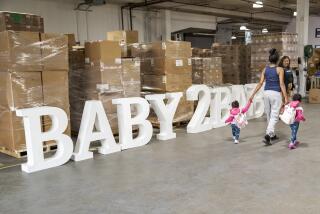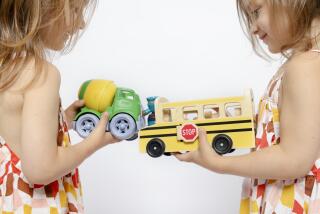Changing Diapers : Small O.C. Firm Hopes Biodegradable Product Successful in Southland Market
- Share via
If a small Orange County firm has its way, the $3-billion disposable diaper industry is in for a change.
This week Vons’ 350 stores in California and Nevada began carrying throwaway diapers that the manufacturer, American Enviro Products Inc. of Placentia, says are almost entirely biodegradable.
The move marks the first big breakthrough in Southern California by American Enviro, which has been selling the Bunnies diapers mostly in the Southeast United States since July.
The difference between American Enviro’s diapers and conventional disposable models, according to the manufacturer, is that the regular diapers take up to 200 years to break down. American Enviro has developed a product that can dissolve within 1 1/2 to 2 years, said company President Robert Chickering.
Depending on the size of the diaper, American Enviro’s products are 85-92% biodegradable, Chickering said Tuesday. “Our goal is to make a product that’s 100% biodegradable,” he added.
American Enviro is not the first to come up a diaper using plastic that quickly rots. At least two other firms already market biodegradable diapers, which are supposed to decompose quickly through natural processes once they are discarded.
If the manufacturers are right, they could be going a long way toward solving a big solid-waste problem.
About 85% of babies in the United States wear disposable diapers, totaling up to 18 billion discarded diapers each year--which account for as much as 2% of U.S. landfill use.
Environmentalists contend that the plastic-and-paper diapers do not decompose once they are thrown away. Instead, they become a potential source of viruses and bacteria that cause infectious disease.
The biodegradable diapers use plastics mixed with cornstarch that allow microorganisms to attack the plastic once it is in the soil, Chickering said. There are also enhancers in the plastic that allow the plastic to break down even in landfills, where the lack of air and moisture makes decomposition virtually impossible, according to Chickering. A biodegradable absorbency powder also is used, he said.
The technology has been available for 10 years. What has happened in the past two years, Chickering said, is that it has become practical and cheap enough to use.
That means that Bunnies diapers retail for about $9.99 for 32 to 60 diapers, depending on the size. (Vons, which sells all baby products at wholesale costs, is selling them for $9.40 per package.) Conventional disposable diapers retail for $9.99 to $10.25.
Since American Enviro began shipping Bunnies in July, about 7.5 million have been sold at retail outlets including Longs Drugs, Target stores and Lucky Stores Inc.’s Northern California supermarkets.
By the end of the year, Chickering estimates the 9-month-old, privately held company will have sold 65 million to 75 million diapers. The products are manufactured under contract in Porterville, Calif., Eau Claire, Wis., and Indianopolis. The firm employs five people at its Placentia offices.
The disposable diaper market is dominated by Proctor & Gamble Co. and Kimberly-Clark Corp.
By comparison, Cincinnati-based Proctor & Gamble, the largest disposable diaper maker, sells $1.65 billion worth of Pampers and Luvs annually.
Officials at both major manufacturers have said that their diapers are as biodegradable as any on the market. Both are skeptical about claims by the biodegradable makers.
But American Enviro and some retailers are unfazed.
“We’re very concerned as a grocery company about the environment and want to offer an environmentally friendly product,” said Mike Roberts, grocery buyer for El Monte-based Vons Cos. “We have documentation from (American Enviro) and their test results. . . . We want to be the first (supermarket) to offer a biodegradable product.”
More to Read
Inside the business of entertainment
The Wide Shot brings you news, analysis and insights on everything from streaming wars to production — and what it all means for the future.
You may occasionally receive promotional content from the Los Angeles Times.










